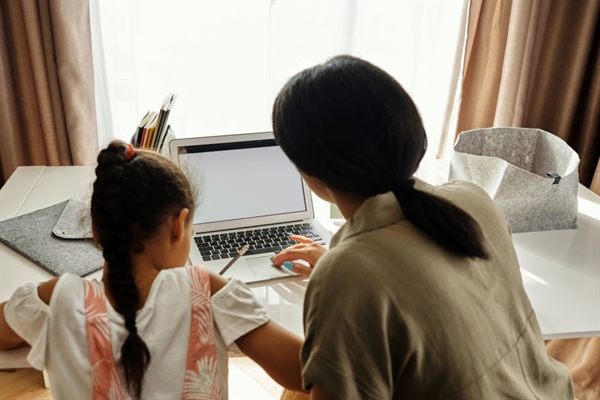Our Parent’s Toolkit on mental health difficulties in children and young people is a resource for any parent or carer interested in these issues. It contains practical information on spotting the signs of mental health difficulties and what to do if you think your son or daughter is struggling, as well as first-person accounts from parents and a young person who’ve lived through it.
Here, a mum speaks about mental health difficulties that were triggered in her daughter by the COVID-19 pandemic and school transition, and shares her tips for anyone who has concerns about their own child.
“In hindsight I can see that my daughter’s difficulties first began when she was 11 (in year 6) during lockdown in 2020. She missed being around other people, she wasn’t able to do her dancing or go to school, and she became quieter and lost interest in things.
“The Year 6’s were allowed to go back for the last two weeks of term, but they missed out on most of the events that normally help them say goodbye to primary school and get ready for secondary. This lack of transition had a big impact. After starting secondary in September 2020, her difficulties escalated super quickly.”
Signs for concern
“I was working from home so I noticed that every day she would come running in the door from school – she would just say she was in a rush. She was into the lifelike ‘reborn’ dolls and asked if she could start making TikTok videos in the reborn community. We’re really hot on social media controls but we let her and made sure they were appropriate and her privacy was protected.
“But the way she was behaving just didn’t seem right. I pressed her on why she was rushing in each day and she admitted she felt that if she didn’t get home by 3pm her grandma would die. We hadn’t realised that the reborn videos had also become an obsession. She told us she felt like she had to post so many videos a day and get so many likes and follows or something bad would happen.
“Now I know these are signs of obsessive compulsive disorder (OCD), but at the time I didn’t. And we weren’t aware of all the rituals she was doing in private, like turning her bedroom light switch on and off three times.
“In October I contacted the GP surgery, and ended up having a phone consultation with a practice nurse. My concerns were dismissed as things that all children were going through due to the pandemic – I was made to feel like an over-reacting mum.”
Taking action
“I’d also noticed that our daughter had lost a bit of weight, and she’d become a fussier eater at home, but it had been a gradual change. However, when my husband saw her without a top on and said he could really see her bones on her shoulders, we were worried. I spoke to her about her weight and she admitted she’d been throwing her lunch away at school.
“It was then we thought we really needed to do something, and I used my health insurance to speak to a 24 hr GP as an emergency. It was a video call with my daughter, including the doctor speaking to her on her own for a while. They made an urgent referral to a psychiatrist.
“Around a week later we had our first online psychiatric appointment – again through my health insurance - and over a few appointments my daughter was diagnosed with anxiety, OCD and an eating disorder.
“The psychiatrist put her eating down to her feeling she was losing control. She wasn’t enjoying school and hadn’t had the usual transition and preparation for it. It was causing her anxiety and she was trying to get some control back through restricting her eating.”
Turning points
“The psychiatrist worked (and continues to work) with my daughter to help her see things in a different way. She also prescribed a low dose of sertraline, which helped the OCD and anxiety almost immediately.
“They referred my daughter to a private nutritionist too, who diagnosed ARFID – associated restrictive food intake disorder. At one point my daughter had dropped to 4 stone, and the nutritionist advised she shouldn’t walk to school or take part in PE because they didn’t want her burning any excess calories.
“Both the psychiatrist and nutritionist spoke very plainly and openly to her about how ill she was. We’re fortunate that she really took it on board and wanted to get better – it meant we could all work together on her recovery.”
Getting better
“The medication was helping her anxiety and OCD so my husband and I put all our efforts into supporting her with her eating.
“The nutritionist helped us to begin the process of ‘re-feeding’ towards the end of December 2020. They created a list of ‘safe’ foods – the very specific things that my daughter was willing to eat – and came up with an eating plan.
“Mealtimes were exceptionally stressful. She would constantly make excuses for not eating much. We had to learn to accept her very strict initial boundaries around what she would and wouldn’t eat and stick to these.
“Just over a year later, she’s now over 6 stone, and for the past few months we’ve been able to slowly introduce more foods that she feels happy to try.
“She’s still on the sertraline, which keeps the OCD under control, but she also has the tools and techniques to manage obsessive or catastrophic thoughts better when they come into her mind.”
Parenting in tough times
“The situation has made me reflect on my relationship with food. I became more aware of how I speak and behave in front of my daughter and have really focused on thinking and talking about exercise for the health benefits rather than weight. Now we talk about being active for health and using food to fuel your body for things like her dancing, which she loves again.
“It’s a tough road, emotionally, but my mum has been a huge help, and has been there to support me. I’m also fortunate that my employer provides tools to support me – I had some counselling and I know I can be open about the situation and block out time to attend my daughter’s appointments.
“Getting a dog has been a massive help for both my daughter and for me. She can give him a cuddle and I can clear my head by taking him for a walk.”
Advice for others
“I’d advise any parent to go with their gut instinct. I knew something was wrong but initially I tried to shrug my daughter’s behaviour off as a phase – part of the approaching teenage years. If I’d gone with my gut, I may have sought help sooner.
“I would also recommend equipping yourself with as much knowledge as you can. I read a book about eating disorders and used information from the charity BEAT. I also found it helpful to follow people with OCD on Instagram, to help me understand what my daughter goes through.
“We still have to things day-by-day, one step at a time, but it was a credit to her progress with the anxiety that my daughter was brave enough to move schools in November 2021. It was part way through the school year, and to a school where she didn’t know anyone, but she’s much happier and it’s helped her make even bigger improvements.”
Resources





